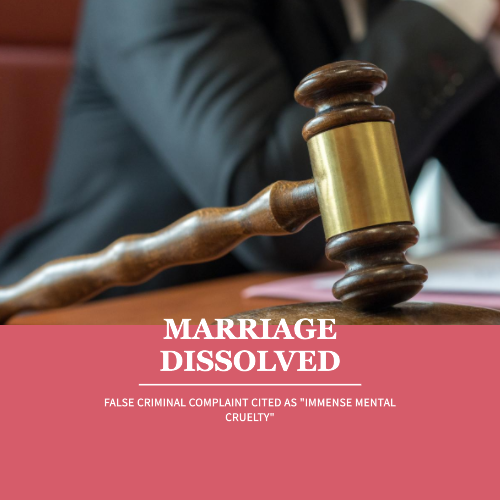
False Criminal Complaints as Grounds for Divorce: In a significant legal development, the Punjab and Haryana High Court, Chandigarh, delivered a groundbreaking judgment on October 29, 2022. This landmark case revolves around a husband’s appeal against the dismissal of his petition for divorce under Section 13-A of the Hindu Marriage Act, 1955, with False Criminal Complaints As Cruelty in Divorce as a central issue. The court’s decision has far-reaching implications for cases involving False Criminal Complaints as Grounds for Divorce. Punjab-Haryana High Court in FAO-M-12 of 2017.
Background and Grounds For Divorce
The case involves a marriage solemnized in 2009-2010, described as a simple union with no exchange of gifts or dowry items. The couple did not have any children. The husband, in his petition, alleged that his wife consistently refused to live with his parents and displayed a hostile attitude from the outset. He claimed that she failed to fulfill her marital responsibilities, frequently picked fights over trivial matters, and insulted his parents. Moreover, he accused her of having a “venom-oozing tongue” and even threatening to file a false dowry case against him.
The turning point came, when the wife left her matrimonial home, taking her belongings and gold ornaments. The husband and his family attempted reconciliation but were unsuccessful.
Legal Issues:
The central issues before the court were as follows:
Whether the wife had subjected the husband to cruelty after their marriage.
wife had deserted the husband for an uninterrupted period exceeding two years.
Whether the husband had withheld any material facts from the court.
Whether the husband was entitled to a divorce as sought.
Failure to Justify Desertion is also Grounds for Divorce:
Additionally, the wife didn’t provide a valid reason for not returning to the matrimonial home and resuming cohabitation. The court concluded that the husband had “made out a case of being subjected to cruelty and desertion,” and the relationship between the two parties had deteriorated beyond repair, as they had not lived together for the past 12 years.
Critical Turning Point and Grounds for Divorce
During the course of the proceedings, the husband presented evidence, including an acquittal order in a criminal case and a complaint against certain individuals. These documents highlighted the husband’s claim that the wife had filed a false criminal complaint against him and his family, which amounted to cruelty.
The court acknowledged that initiating false criminal cases against a spouse and their family members could indeed constitute cruelty, citing relevant legal precedents. In this case, the husband and his family had been acquitted of the charges, with the court finding that the prosecution had failed to prove its case. The court emphasized that filing false complaints with malicious intent is a form of cruelty and a valid ground for divorce.
The Doctrine of Irretrievable Breakdown
While the Hindu Marriage Act, 1955, does not explicitly recognize irretrievable breakdown as a ground for divorce. The court considered their separation since October 2013 and failed mediation attempts. This separation indicated irreconcilable differences between them, rendering the marriage a mere legal fiction.
In light of this, the court referred to previous Supreme Court judgments and granted the divorce. It emphasized that a broken marriage, compounded by false allegations and malicious litigation, cannot be resurrected.
A Fair Resolution
The court’s decision was not without compassion. Court ordered husband, who had been paying interim maintenance, to provide a one-time alimony of INR 10,00,000 for final settlement.
Conclusion
This landmark judgment underscores the significance of recognizing false criminal complaints as a form of cruelty in divorce cases. It underscores Indian courts’ evolving stance on irretrievable breakdown despite lacking explicit legal provisions. This sets a precedent for cases involving false criminal complaints, offering relief to innocent parties seeking divorce due to cruelty.



Leave a Reply